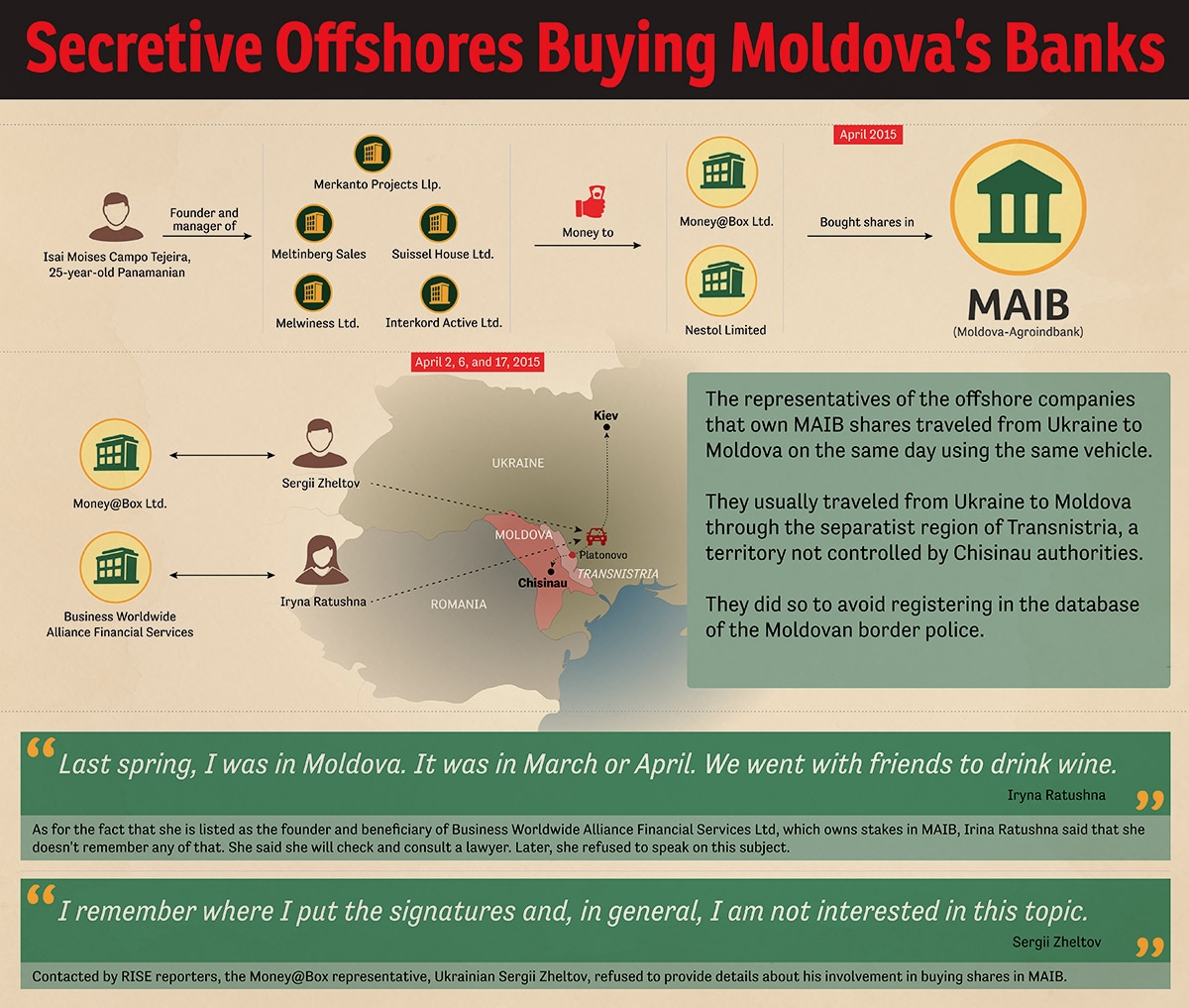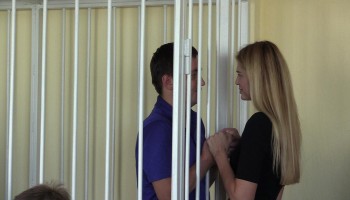Banker Veaceslav Platon, a former parliamentarian detained in Kyiv on Monday for allegedly taking part in the theft of US$ 1 billion from three Moldovan banks and laundering billions through others, spent the months leading up to his arrest trying to take over yet another Moldovan bank, RISE Moldova has learned.
Prosecutors say Platon, 43, is linked to the infamous 2014 theft of approximately US$ 1 billion through corrupt loan deals involving three of Moldova’s banks: Banca de Economii, Unibank, and Banca Sociala. On Tuesday, Moldovan authorities announced they had started extradition proceedings.
Authorities say the scam used offshore companies to obscure the three banks’ real ownership, while using another set of equally secretive companies to steal the banks’ money. The plot led to the closure of the three banks and taxpayers saddled with the losses, and led to street protests by furious Moldovan citizens.
Prosecutors also say Platon was involved in the US$ 20 billion Russian Laundromat money-laundering operation, uncovered by the OCCRP in 2014.
But OCCRP partner RISE Moldova has learned the alleged crimes are not the limit of Platon’s dealings. For the last few years, Platon has been involved in a behind-the-scenes war with the state over the ownership of at least two additional Moldovan banks.
The war, which involves Moldova-Agroindbank (MAIB) and Victoriabank, comes at a terrible time for the impoverished country.
Moldova’s financial system faces imminent collapse. The International Monetary Fund, the World Bank, and other international lenders have suspended or reduced financial assistance, citing widespread corruption in the country’s banks. Moldovan authorities are trying to clean up the system but say they have little idea who is behind the opaque offshore companies that own key Moldovan banks.

Using their regulatory powers, the government has aggressively acted over the past year to keep Platon and offshore companies out of the latest set of banks being bought up.
Meanwhile, prosecutors say there is evidence Platon and others behind the offshores are coordinating their efforts to tighten their grip on the banks: using money from the same offshores to buy bank shares; traveling together to Moldova in the same cars; and using computers with identical IP addresses.
The battle is being fought on many fronts, including the Stockholm Arbitration Court. RISE Moldova, an OCCRP partner, has investigated the warring factions.
Moldovan banks have long been notorious for being deeply involved in the region’s largest money laundering schemes, going far beyond event the massive 2014 theft of which Platon is accused and which involved a figure that equals more than 10 percent of Moldova’s gross national product. Russian and Ukrainian state officials, regional organized crime groups, and regional businesses have long used Moldovan banks to launder tens of billions of dollars of ill-gotten gains and move billions more into Europe.
Moldovan banks are notorious for hiding their true ownerships behind secretive structures in which shares are held by shadowy offshore corporations.
Moldovan law requires that anyone owning more than one percent of a bank’s share capital be identified and approved by the Moldovan National Bank (MNB).
Some Moldovan banks get around this by employing “consortiums” of anonymous offshore companies, each of which holds 0.99 percent or less. The MNB suspects that many of these consortiums are controlled by one individual or group, intentionally skirting Moldovan law.
RISE Moldova talked to Platon before his arrest and looked at his latest attempts to secure another Moldovan bank.
Interview With Veaceslav Platon
Hunting a Moldovan Bank
Artiom Platon, 19, loves rock music. He was the guitar player for Sorrow Means Will, an experimental metal band formed in the Moldovan capital of Chisinau in 2012. At that time, Artiom tried to raise US$ 500 on Indiegogo, a crowdfunding site, so that his band could record in a professional studio.
He only managed to scrape together US$ 130, well short of his goal.
Three years later in 2015, the young rocker suddenly found his money problems had disappeared when he received a US$ 40 million “donation” from his father, Veaceslav.
RISE Moldova examined the US$ 40 million transaction between father and son and found that the money was channeled via a company involved in the Russian Laundromat, a complex money laundering platform identified by OCCRP. The Laundromat had previously been used to secretly transfer US$ 20 billion from Russia to the European Union (EU) via Moldinconbank, a Moldovan bank where the elder Platon was a 4 percent shareholder.
The elder Platon also had an interest in another Moldovan bank, Victoriabank, through an offshore company called Volmark Trade Ltd. His last public appearance in Moldova was in 2014, when he appeared before Parliament in Chisinau as a legal representative of Volmark Trade to protest a move by the MNB to stop Volmark from obtaining shares in Victoriabank.
In 2014, increasingly at odds with Moldovan authorities, he moved to the Ukrainian capital of Kyiv, where he was arrested Monday on an Interpol warrant. He was using a fake Ukrainian passport. In the interim, he conducted business via his son and a slew of offshore companies.
The US$ 40 million Platon sent to his teenage son was to buy shares in yet another Chisinau-based bank, MAIB, one of the largest financial institutions in the country.
The donation agreement between father and son was drafted on June 22, 2015. The confidential document stated that the US$ 40 million was to be transferred in full or in installments up to Dec. 31, 2018.
When Moldovan authorities blocked the sale, Platon challenged the decision.
The Donation
Reporters for OCCRP met Veaceslav Platon in downtown Kyiv in March of this year. The reporters asked him about the millions transferred to his son, and about his ongoing fight with the Moldovan National Bank.
Platon said the decision to invest in MAIB was his son’s idea: “I offered him 40 million lei to invest in financial and non-financial assets. When he asked me how I evaluated the investment attractiveness of MAIB, I said it would be a good investment that will bring a good return in the future.”
When the reporter pointed out the documents show the loan to his son was US$ 40 million and not 40 million lei (about US$ 2 million), Platon first disagreed and then said the documents were mistaken.
“This is a mistake. I have not given that much money,” Platon said. When shown the documents, he eventually admitted that the amount donated was in dollars and not lei, calling it a mistake by his secretaries.
“Today I gave this money as a gift, tomorrow I asked him to give it back ... Who cares? I am on good terms with my son,” he said.
On Jan. 29, 2016, in Chisinau, armed with the donation paperwork, Artiom Platon signed a contract to buy 0.95 percent of the shares in MAIB. The shares were to be bought from a British company called Money@Box Ltd., represented by Ukrainian citizen Sergiei Zheltov. However, the transaction was stopped when the MNB suddenly canceled Money@Box’s shares of the bank.
The MNB suspected that Money@Box, along with other companies, was fronting for a person or group of persons acting together to purchase a significant volume of shares without disclosing the identities of the real beneficiaries.
On Dec. 23, 2015, the MNB concluded that Money@Box Ltd. had acted in concert with three other offshore companies -- Nestol Ltd., Business Worldwide Alliance Financial Services Ltd. and Advanced Asset Protection Ltd. -- to purchase shares in the bank's capital without the prior consent of the MNB.
RISE reporters found multiple connections between the people acting as representatives of these companies, which may be an indicator that they indeed acted in a coordinated way.
The MNB took several steps before cancelling the shares. It first asked the companies to sell the shares in an open and transparent manner. When that didn’t happen as quickly as the MNB wanted, it decided to cancel the shares and issue new ones to be sold on the stock market, with the money going to the companies.
The Loan
After the Money@Box transaction was thwarted, Artiom Platon upped the stakes, notifying the MNB that he now wanted to buy a 10 percent stake in MAIB.
Once again, the shares were to be bought from other offshore companies that owned chunks of the bank. The younger Platon repeated that the money--this time US$ 60 million--was from his father. Veaceslav Platon told RISE Moldova that the US$ 60 million was money he lent in cash to an offshore company called Felina Investments back in 2001.
The loan was mentioned in a tax statement filed by Veaceslav Platon with the Moldovan tax authorities in 2012. However, the elder Platon failed to declare that same loan for the year 2009 in the parliamentary asset declaration he was required to file as a member of the Moldovan parliament. It is mandatory under Moldovan law that politicians declare their wealth and assets including loans.
Besides this legal tangle, prosecutors say they are investigating Felina for its alleged involvement in the Laundromat. Felina was initially established in the British Virgin Islands (BVI) and then replaced in the loan deal by a Delaware-based company with the same name.
The same Felina Investments is connected to another murky purchase of MAIB shares. On April 16, 2015, Felina lent US$ 819,000 to British-based Tush Enterprises Ltd. On that same day, Tush bought 0.9 percent of MAIB shares. Tush Enterprises Ltd. was established in 2014 by a former Ukrainian policeman, Ivan Liubymov.
In March of 2016, the younger Platon's attempt to buy the 10 percent stake in MAIB was again foiled by MNB action.
On March 2, the MNB moved against a group of 20 shareholders, who together held 39.58 percent of MAIB’s shares, saying they had colluded. Platon intended to buy the 10 percent from these shareholders. The MNB argued that the shareholders had previously acted in concert without MNB permission to acquire their nearly 40 percent of the bank’s share capital.
The Moldovan General Prosecutor’s office says that an investigation is ongoing regarding the shareholder’s purchases.
"We have initiated criminal proceedings. Some persons were taken into custody and some of them had to go to court,” prosecutors said in a statement. Prosecutors have not identified other parties involved.
Viorel Morari, the head of the Moldova’s Anti-Corruption Prosecutor's Office, told RISE that prosecutors are pursuing several lines of inquiry regarding the source of the money that was used to buy MAIB shares.
“We are investigating. We have come up with several versions on the origin of this money,” Morari said. The fact that the companies used in the purchase were based offshore made the task more difficult, he said.
In an unexpected twist, the MNB’s efforts to move against the 20 shareholders were dealt a blow on June 14 by the Institute of Arbitration of the Chamber of Commerce in Stockholm (SCC).
The SCC recommended that the Moldovan authorities’ move be suspended pending the result of a case filed five days earlier with the SCC by Kompozit LLC, a company from St. Petersburg, Russia, which holds a 0.98 percent stake in MAIB and whose beneficiary is a Russian citizen named Igor Bevza.
The lawsuit was filed under the provisions of a Moldovan-Russian agreement on the mutual protection of investments. The suit called for an emergency examination of the MNB’s move, which it labeled illegal.
The Moldovan authorities did not comply with the recommendation and went ahead and cancelled the shares. MAIB issued a new set of shares that will be auctioned on the stock exchange on Sept 28.
Nicolae Esanu, Moldova’s deputy justice minister, told RISE Moldova that the case is under review.
The Stockholm ruling followed a March 2016 move by the MNB to fire three MAIB board members appointed by the offshore companies. The MNB said it made the move after establishing that the MAIB shareholders had colluded to work in concert.
"After establishing a coordinated action by Moldova-Agroindbank shareholders, on March 16, 2016, MNB withdrew confirmations of three members of the Bank's Board as they no longer meet the legal requirements as administrators," read the MNB news release.
A few days later, anti-corruption prosecutors detained one of the three removed board members, Stela Pahomi, for alleged money laundering. The prosecutors suspect that Pahomi was involved in a scheme to steal shares from other MAIB shareholders.
Authorities say Pahomi, considered one of the elder Platon’s confidantes, forged several power of attorney authorizations, enabling a third party (Evrobalt LLC) to represent the interests of shareholders without their knowledge. Evrobalt then transferred 4.5 percent of MAIB shares to the accounts of an offshore company. Police officers are also being investigated for allegedly taking part in the scheme.
Veaceslav Platon did not want to discuss the case with reporters. “I don’t want to talk about Stela Pahomi because she’s under arrest and I don’t think she is comfortable. I also don’t want my words to be misinterpreted to hurt her some more. Given the situation, I don’t think it would be fair for me to talk,” he told RISE Moldova.
There are other connections between Veaceslav Platon and MAIB.
In 2015, for example, Platon received to his MAIB credit card account 4.7 million Moldovan lei (about US$ 250,000) from a British company called Tayra Ltd., represented by Ukrainian citizen Lesia Lahoda, 30. The payment was marked as “dividends.” Tayra made the payment after receiving US$ 538,000 from another company, Multigold Production Ltd., which owns 4.2 percent of MAIB’s shares.
Veaceslav Platon told RISE Moldova that he was connected to Tayra Ltd. but said he had a service contract with the company.
Platon’s son Artiom did not respond to multiple requests for comment.








